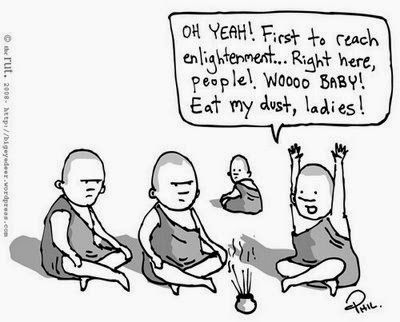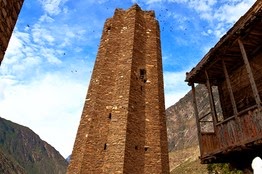Pat Macpherson, Seth Auberon, Xochitl, Crystal QCrystal Quintero, Wisdom Quarterly; Malcolm Gaskill, Wall St. Journal (online.wsj.com, 11-26-14); Roxanne Dunbar-Ortiz, Sonali Kohlhatkar
 |
| [Look how the white invaders, squatters, and conquistadores are feeding and welcoming the Natives to their newly stolen land.] Having left the Old World for the New, they clung to their old identities and tried to preserve them (Graphicaartis/Corbis). |
.
Pilgrims and the Roots of U.S. Thanksgiving
English settlers of the 17th century were a diverse lot, and they became Americans despite themselves.
In the fall of 1621, 50 English men and women and 90 Native Americans gathered at New Plymouth in Massachusetts. The colonists had arrived a year earlier on a leaky wine ship, the Mayflower [to deal alcohol to Puritans or encourage drunkenness in the Natives?], and built a hillside settlement overlooking the ocean, little more than a few wooden huts in a stockade.
 |
| What is there to eat in this land, Sage? (WQ) |
The first winter had been terrible: Half their number had perished from malnutrition and disease.
They had struggled to farm the land, were poorly supplied from England, and
relied on their Indian hosts [who were kind and humane enough to offer help only to be stabbed in the back in return?] for expertise and food.
But in the end, they did it. According to Edward Winslow, who had buried his wife that March, “Our harvest being gotten in, our governor sent four men on fowling [to kill fowl, i.e., Mexican turkeys?] so that we might after a special manner rejoice together after we had gathered the fruits of our labor.”
 |
| Buy Nothing Day, WalMart protests, rejecting "Black Friday" propaganda (occupy.com) |
.
[Such a beautiful way of speaking, of using euphemisms to conceal the daily horrors of what they were doing and what they were sent to do, which was not to find religious freedom as we are told but to establish capitalist camps to feed the rich in Europe. That capitalist consumption machine we fed in England and Europe was then/is now turned back on us, and we are the feeders feeding off other colonies. Better to celebrate the day after Thanksgiving,
Black Friday, like Ad Busters recommends: Buy Nothing Day, a wildcat (general) strike, and anti-consumer capitalism demonstrations.
Occupy not other peoples' land but consumer-capitalism itself. Most Americans/US citizens have no idea what "capitalism" means, but we all have our mythic ideas and notions, the misbegotten belief that if we sell something,
OH! we're capitalists! That does not make one a capitalist, nor does buying. Read up on "capitalism," or not, because it might radicalize you, and you might come to understand why so many revolutionaries gave their lives for the sake of equality rather than continuing to live for the economic enslavement of a majority of people. Down with consumerism.]
The Pilgrims, as they would later be known [because at this point it was clear to all that they were colonizers and invaders heroically called "colonists" and "survivors"], celebrated for three days [a custom from around the world, a Harvest Festival of abundance] -- an event immortalized in American history as the first Thanksgiving.
 |
| Buckles mean style, wealth. |
The story has been heavily mythologized, and the numerous depictions of it [showing the White Man's Burden of coming to help those savage "Indians" survive because they were godless barbarians who didn't know anything and needed our British, Spanish, French, Dutch, and later German (Nazi) "help"] that have come down to us are mostly patriotic romances, full of errors about the dress [what, no big belt buckle pants, shoes, and hats?!], technology, and general atmosphere of the day.
 |
| What is the real story? See video below. |
What we most tend to overlook in the Thanksgiving
tale, however, is the wider context of
settlement [illegal military invasion and occupation, illegal settlements like Israelis encroaching on Palestinians while ethnically cleansing them in an "incremental genocide"]. English colonists -- 350,000 of them in the 17th century -- were a diverse lot [all white except for their chattel or "property" slaves], and more English than you might imagine.
Having left the Old World for the New, they clung to their old identities and tried to preserve them. In this, they failed, and yet from that failure, a new national character was born -- the primary traits of which are still visible in Americans today [that would be us, and that's why this matters].
The first colonists [i.e., colonizers] actually arrived more than a decade before the Mayflower, establishing themselves on [i.e., squatting and illegally occupying] the steamy river [slave] plantations of Virginia and the rocky coasts of Maine. The northern colony failed within a year. The Virginia settlements fared better, and thousands of young, mostly male apprentices poured into the tobacco fields to toil alongside growing numbers of enslaved Africans.
 |
| Racist KKK killers are real? |
A similar pattern developed in the other Chesapeake colony, Maryland. In the 1630s, successive waves of Puritan [a "Puritan" is a super-Christian, a rigid Spartan, Trojan, bigot, and fundamentalist, nice folk, but a little stiff and prone to take their Bible literally and stoning people, locking them in stockades, torturing, shaming, raping, molesting their kids, killing infidels (defining as anyone who does not agree with their world view or interpretation of that Bible), committing genocide, engaging in sexism, racism, and slave-based capitalism] ships reached Massachusetts, their passengers settling in Boston and its satellite communities.
After this great migration came the “great reshuffle.” Settlers relocated to Rhode Island, New Hampshire, and the lush [ecologically well tended Indian, Native American] plains of the Connecticut Valley, which in turn attracted newcomers from England. Meanwhile, the French settled in Canada and the Dutch in present-day New York.
By 1660, there were 58,000 colonists in New England and the Chesapeake, compared with 3,000 in New France and 5,000 in Dutch New Netherland. Most English migrants -- 190,000 of them -- went to the West Indies, where slave-owning planters specialized in [white] sugar production [stripped of healthy molasses] and sustained New England by importing its food crops.
 |
| John Smith was a "savior"? |
Virginia began life in 1607, at a quasi-military outpost called Jamestown. Captain John Smith, its leader and savior, described “pleasant plain hills and fertile valleys, one prettily crossing another…a plain wilderness as God first made it.” But this was no Eden. Appalling conditions -- hostile natives [it seems people don't like their ancestral lands overrun by filthy, disease-ridden vermin-eating cannibals calling themselves Christians coming to contaminate, rape, spread new diseases, steal, plunder, and enslave], polluted water, and rampant disease -- were made worse by infighting and political chaos.
Unable to grow enough food, the colonists faced starvation by the winter of 1609. They ate vermin and leather -- even the starch from their collars. “Nothing was spared to maintain life,” recalled George Percy, “and to do those things which seem incredible, as to dig up dead corpses out of graves and to eat them.”
Nine out of 10 died, and the survivors and their often clueless replacements still had to find exports like timber, furs, and pitch to pay their way. In the end, a farmer named John Rolfe cracked the problem with a new strain of sweet tobacco. A year later, there were wooden vending machines for tobacco in London alehouses. Virginia was in business.
Colonists always needed more land, but they had to tread carefully. Rolfe married an Indian princess named Pocahontas, which delighted the Virginia Company.
 |
| Becky collaborates with Rolfe and Smith. |
The union meant ethnic peace in America [or a tiny, tiny part of it called a British colony, not even a united state] and made for good propaganda at home. [Poke-a-who, b-tch? We'll call you Becky, and you'll be at our beck and bloody call, because this is a hierarchical Christian "marriage" not an egalitarian Indian one.] Renamed Rebecca Rolfe, she was received [i.e., brought to against her will] at the royal court in London, where, Smith noted, those clamoring to meet her “had seen many English ladies worse favored, proportioned, and behaviored.” [That means she was pretty, nice, and well mannered much to their amazement; after all, she was a "savage darkie" to their racist assumptions.]
Pocahontas’s death as she prepared to return home, probably from tuberculosis [one of those new European diseases for which she had no immunity], destabilized relations with her people, and a dark cloud passed over Virginia. In 1622, a native uprising killed 347 colonists [hmmm, wonder if the Natives have oral histories of all the times there were "foreigner uprisings" and how many Natives those offshore savages/invaders killed, raped, or stole from] -- a third of all English people in America.
Even those who had come over to spread the gospel [of peace, love, and secondhand Mahayana Buddhism the Chinese and Afghan Buddhists had already brought to America far on its western shore in California and Mexico centuries earlier, according to the American historian Edward P. Vining working and publishing An Inglorious Columbus in 1885] hardened their hearts.
Now the English would take [i.e., steal] what they wanted. “Our hands, which before were tied with gentleness and fair usage,” remarked the Virginia Company secretary, “are now set at liberty.”
More
Thanksgiving Day Special: An Indigenous History of the United States
An Indigenous People’s History of the United States, Nov 2014
(Uprising with Sonali) Author, academic, and activist, Roxanne Dunbar-Ortiz spends an hour sharing
the true origin story of the United States, which is particularly relevant during the national Thanksgiving holiday.
More
 |
| China's art buyers look West for overseas buys (online.wsj.com). |






























































































































































































































































































